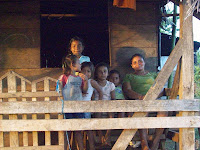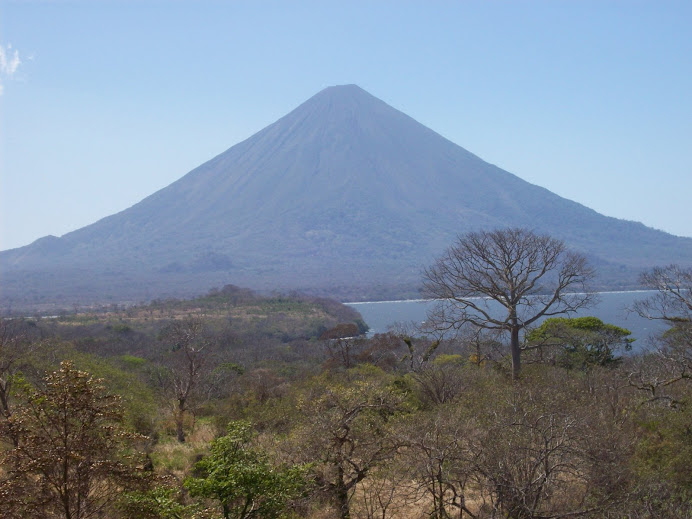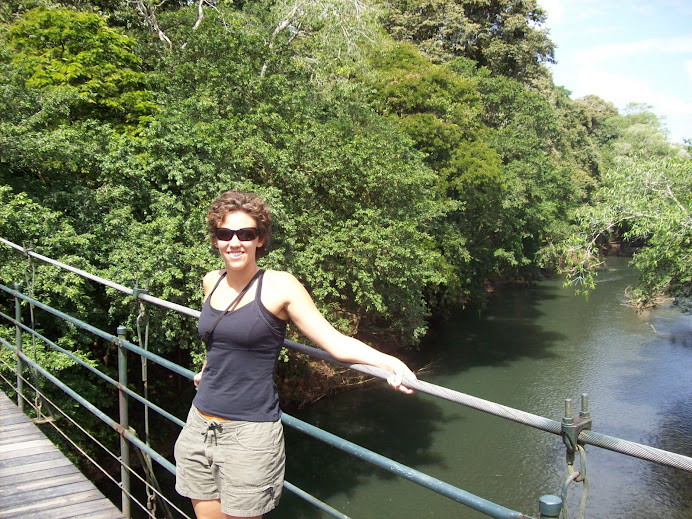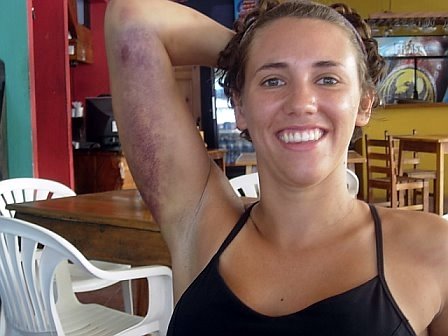 Bonboy lowering the turbine
Bonboy lowering the turbine The Aguirre family
The Aguirre family David, Julie, and Lillian, one of Monkey Point's
David, Julie, and Lillian, one of Monkey Point'scommunity operators
 Lillian's family
Lillian's family Rama boy in the Punta de Aguila school- these kids were awesome!
Rama boy in the Punta de Aguila school- these kids were awesome! Got back on Tuesday morning from our first trip to Monkey Point and Punta de Aguila. Naturally, I've got lots of bug bites and some minor stomach issues, but overall am feeling great and anxious to get back to the communities. Bluefields is an interesting city and its a good time to be here considering the month of May is when they celebrate the May Pole festivities, said to be the best parties all year. However, its still a city, and while here I'm usually spending most of the day sitting in the blueEnergy office in front of a computer. Not my favorite thing to do. Getting up at dawn in Monkey Point, eating fresh tortillas and gallo pinto made with coconut milk, swimming in the Caribbean Sea, hauling buckets of water from the spring and wells, playing with kids and puppies, chatting with locals about their lives, the war, their families, their interest or lack thereof in blueEnergy's projects, playing soccer on the beach, attending crazy town meetings in which communal decisions are made on pigs, drugs, and who can live in the community and who can't, is all just so much more fun and interesting. I'm definitely missing life in Monkey Point, and am disappointed that we won't be going back for at least two weeks. However, we have a lot to do here as far as preparing ourselves and materials to take back to the communities to teach about energy, get the energy commission organized, hold meetings to find out what the community actually wants from the next step of the blueEnergy project (batteries, minigrids?), teach on water, health, and sanitation, as well as English. Ambitious, yes, and that's just the beginning. Next week we'll be going through training with the Ministry of Education's Yo Si Puedo system, an adult literacy education program that originated in Cuba. The program is already being implemented in Monkey Point at night in the blueEnergy-powered school with adults, but we're hoping to get more community members involved (very few are literate or have above a 3rd grade education if any), maybe teach a second class each night, and give private lessons to one of our community operators who is smart, motivated, trustworthy, and very capable of becoming a leader in the community and specifically with the energy project, but lacks the reading and writing skills to be given the responsibilities that we'd like to give her. So we're going to have a very busy two weeks preparing here in Bluefields, as there is a lot we'll be doing during our two months in Monkey Point. And that's not even taking into consideration Punta de Aguila.
I'm hoping to make the trek down the beach and through the bush to the Rama community of Punta de Aguila once a week or so while we're living in MP in order to begin the process of getting blueEnergy's project back up and running there. Communication has been a huge problem with this community where bE actually installed their first turbine, as it is an indigenous community that is accustomed to missionaries coming and going, but doesn't have a lot of experience with development projects that are ongoing. While its a settled community, people are constantly coming and going between the community and Bluefields or the community and the bush, so you never know when you arrive who you will find there, and if you plan to hold a meeting with the leaders as we did, you can't necessarily expect them to show up because our notion of making a plan is much different than theirs. I don't think blueEnergy has extremely high hopes of what can get down in Punta de Aguila over the next few months, but it would be helpful if David and I could make attempts to show up in the community and meet with leaders, help the energy commission to get reorganized, and just get people talking again about the energy project, find out who's interested, what next steps should be taken (if any), etc. Also, this week I attended a couple workshops on the Rama Language Project, and told the Punta de Aguila schoolteacher that I am interested in helping him to teach Rama in the school. Actually, it was more like once I expressed interest in the language a few weeks ago during the community operator training, he has been pushing me to attend these workshops, start learning the language (which I have been doing!), and to help him teach. During the bE community operator training, he said that one of the main things that PA wants to use the energy for is to have light in the school at night to teach Rama. Of course I find this fascinating and exciting, and extremely reminiscent of my time in the Moseten village of Inicua in Bolivia back in 2002 when I was working to get the community motivated to begin teaching their language again, to take pride in it, to not lose it. Well Colette, the mother of the bE directors Mathias and Guillaume, has been working on this project for over 20 years and now has materials that can be used to teach the Rama language. She too has been encouraging me to get involved in teaching the language, helping to build the Rama dictionary, and doing what I can to contribute to the language revitalization movement during my short time here. So while I don't expect to have much free time while I'm living in Monkey Point in June and July, I'm hoping to spend a couple of days every week or so in Punta de Aguila helping to support both the energy commission and the revitalization of the Rama language through teaching in the school to both children and adults, and collecting words, pictures, and ethnographic notes to add to the dictionary. Those two projects can and should go hand in hand.
I know I can't get too high of hopes for what can be done in just June and July, because really that's no time at all, but there is so much that I can do and that I want to do. Of course one important part of being in the communities is going to be just being. Sitting and talking with people, or just sitting and listening. Going fishing, going into the bush, cooking, playing with children. I can't get any "work" done without integrating into the community and participating in all those kinds of activities first, and throughout the entire time that I'm there.
For now, time to try and enjoy Bluefields. On Tuesday night David and I went out to what is probably the nicest restaurant in town where we ate lobster and prawns and drank Flor de Cana (tastiest rum in the world). It was quite the treat after Monkey Point, where hadn't even had the luxury of sitting down to eat together at a table. Not that I really minded that, but it was definitely fun to treat ourselves and really splurge. Although the food and drinks only cost around $30, that was definitely a huge splurge for Bluefields. It was worth it.
On Thursday we had our first night out, although David and I didn't last past 12:30 at the club. It was fun, but we've become so used to going to bed early and getting up early since living in Costa Rica, and are so content with that lifestyle, that its just hard to stay out late. My stomach issues don't make it any easier. The hour or so we spent at the club was definitely worth it though. The place, Four Brothers, is basically just a tin shack with a bar and a DJ blasting reggae and all kinds of Caribbean jams through very poor quality speakers. The place wasn't too full as it was still early and only Thursday, but the locals there seemed to be having a blast. All of the dancing was everything I'd heard I should expect in Bluefields- simulated sex. And this wasn't the kind of fast hip-gyrating sort of dancing that I've seen in other places. This was even more erotic because it was so slow. No wonder there are so many teenage mothers, even the kids do this kind of dancing! I'm looking forward to attending some of the May Pole festivities during the next couple of weeks and seeing how all of that goes down. Supposedly the parties are going to get better and better and then climax with the best one on the 30th. We'll see if David and I can stay out past 1 am for some of these. I think we'd better try.
































